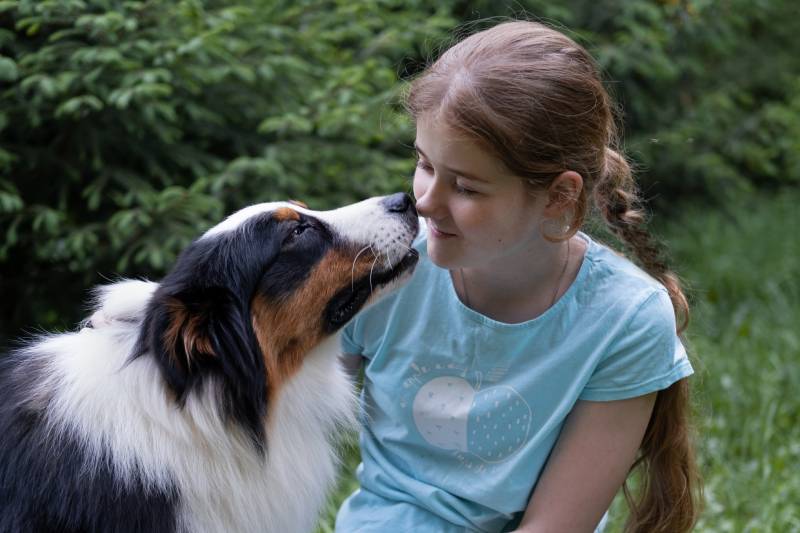Can Dogs Smell Emotions? What Science Tell Us

Updated on

It’s no secret that dogs have a ridiculously good sense of smell. Not only can they detect subtle scents like truffles, and possibly even detect cancer, but some believe their noses are so sensitive they can even pick up on our emotions! But is this truly possible? It is possible for dogs to pick up on our emotions, but it’s not the emotions they’re smelling; it’s the hormones that cause them. Let’s find out more in this article.
Brief Overview of the Dog’s Sense of Smell
Dogs have far more sensitive noses than humans. Their sense of smell is actually up to 10,000 times more powerful than ours! On top of that, they possess 300 million olfactory receptors in their perfect snoots, while humans only have 6 million. This means dogs can detect scents at a much lower concentration than us and can even pick up on chemicals we cannot smell.
The Science of Emotions
Emotions are biochemical reactions that occur in the body. Hormones and neurochemicals like serotonin, dopamine, adrenaline, and oxytocin regulate them. These chemicals create physiological responses such as increased heart rate or sweating, which can be detected by discerning noses.
So, dogs can’t technically smell our emotions. However, what they may be smelling are the hormones 1 that cause these emotions, which allows them to tell when we are feeling happy or sad, for example.

What Emotions Might Dogs Be Able to Smell?
There are several different types of emotions that dogs may be able to detect, including fear, anger, love, joy, sadness, and more. Each emotion has its own unique biochemical signature due to the release of different hormones and neurochemicals. It is believed that dogs may be able to pick up on these signatures and determine how a person is feeling based on their scent.
The Physiological Responses That Accompany Emotions
When a person feels an emotion, certain physiological responses accompany it. For instance, when someone experiences fear, the heart rate increases, and the body may begin to sweat. These physical reactions can alter the chemical balance in the body, releasing different pheromones or hormones into the air, which a dog’s sensitive nose could potentially detect.
The Chemical Language of Emotions
Certain chemicals have been linked to different emotions. For instance, dopamine and serotonin are associated with feelings of joy or contentment, while adrenaline is often associated with fear or anger. Dogs may be able to pick up on these scent markers in the air and determine which emotion a person is feeling based on their unique biochemical signature. In other words, dogs can smell what our bodies are doing, even if they’re making emotions.

So, Can Dogs Smell Emotions?
It has long been speculated that dogs can sense our emotions, but studies have recently been conducted to test this theory. Several experiments have been done in which dogs were presented with sweat samples from people experiencing different emotions, and the results showed that the dogs were able to distinguish between them.
The results of these studies suggest that dogs may indeed be able to smell emotions. The studies did not definitively prove this, however, as there could have been other factors at play, such as differences in body odor or pheromones. Further research is needed to truly determine whether this is possible.
How Else Do Dogs Detect Emotions?
Dogs are known for their ability to perceive and respond to human emotions. Besides relying on their sense of smell, dogs can detect our emotions through subtle cues. For example, they can pick up on changes in our facial expressions, body language, tone of voice, and even heart rate and breathing patterns. Dogs also have a keen sense of empathy and are able to sense when we are feeling sad, anxious, or stressed. This is one reason dogs are often used as therapy and service animals to help calm and comfort people.

Are Dogs Better at Detecting Emotions Than Humans?
Dogs certainly seem to be more attuned to subtle emotional cues than humans. However, it’s impossible to say definitively that one is better. While they may not possess the same cognitive abilities as humans, dogs can pick up on things we may miss or overlook. This is why they are often used as therapy animals to help comfort and calm people.
It’s clear that dogs can sense how we are feeling, even if we don’t show it outwardly. Dogs can detect our emotions through their superior senses of smell that detect our hormones in ways that humans simply cannot.
Other FAQs
Can Other Animals Smell Emotions?
While there isn’t much scientific evidence on this topic, some experts believe that certain animals, such as horses and cats, may be able to sense our emotions through scent. However, more scientific research is needed to determine whether this is possible.

Do Dogs Get Better at Detecting Emotions Over Time?
Research has shown that when a dog is repeatedly exposed to certain smells and emotions, they become attuned to them. This means that the more familiar a dog is with the scent of a certain emotion, the better it will be at recognizing it.
Is There Any Way to Train My Dog in This Area?
While no specific “emotion detection” training program is available, activities such as obedience training and positive reinforcement can help improve your dog’s ability to detect subtle emotional cues. The key is exposing your pup to different situations while rewarding them for good behavior, so they learn to respond appropriately. Providing plenty of mental stimulation and socialization opportunities can also help your pup learn how to interpret different emotions.
Are There Any Health Benefits Associated With a Dog’s Ability to Detect Emotions?
Studies have shown that having a pet can reduce stress levels and provide comfort in times of need. Additionally, dogs may be able to detect when someone is feeling down or anxious and thus act as emotional support for them. Dogs have also been known to “tell” their owners when something is wrong, such as if they are in danger or ill. As such, having this connection with your pup can benefit both the dog and its owner.

Is It Possible for Humans to Learn How to Detect Emotions the Way Dogs Do?
While it may not be possible to replicate a dog’s emotion detection level, humans can benefit from paying more attention to subtle changes in body language and facial expressions. With practice, we can become more aware of how our emotions affect others and better interpret the feelings of those around us. This ability can be useful when building meaningful relationships with people.
Conclusion
It’s clear that dogs have an incredible sense of smell and may be able to detect emotions based on scent alone. Further research is needed to truly understand how this works, but it appears that dogs have the ability to pick up on each of the subtle cues in our body language or posture, which can indicate what emotion we are feeling. Understanding how dogs can detect emotions could help us better understand our canine companions and strengthen the bond between us.
Featured Image Credit: Aleksey Boyko, Shutterstock












